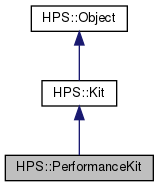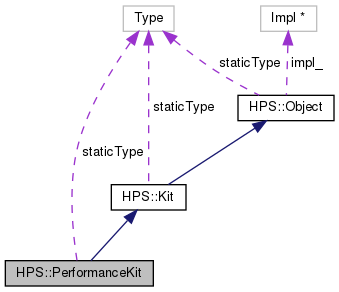The HPS::PerformanceKit class is a user space object, useful for carrying a group of attribute settings related to performance settings. More...
#include <hps.h>


Public Member Functions | |
| PerformanceKit () | |
| Initializes an empty kit. More... | |
| PerformanceKit (PerformanceKit const &in_kit) | |
| The copy constructor creates a new PerformanceKit object that contains the same settings as the source object. More... | |
| PerformanceKit (PerformanceKit &&in_that) | |
| The move constructor creates a PerformanceKit by transferring the underlying impl of the rvalue reference to this PerformanceKit thereby avoiding a copy and allocation. More... | |
| PerformanceKit & | operator= (PerformanceKit &&in_that) |
| The move assignment operator transfers the underlying impl of the rvalue reference to this PerformanceKit thereby avoiding a copy. More... | |
| virtual | ~PerformanceKit () |
| Destroy this kit. More... | |
| HPS::Type | ObjectType () const |
| void | Set (PerformanceKit const &in_kit) |
| Copies the source PerformanceKit into this object. More... | |
| void | Show (PerformanceKit &out_kit) const |
| Copies this object into the given PerformanceKit. More... | |
| PerformanceKit & | operator= (PerformanceKit const &in_kit) |
| Copies the source PerformanceKit into this object. More... | |
| bool | Empty () const |
| Indicates whether this object has any values set on it. More... | |
| bool | Equals (PerformanceKit const &in_kit) const |
| Check if the source PerformanceKit is equivalent to this object. More... | |
| bool | operator== (PerformanceKit const &in_kit) const |
| Check if the source PerformanceKit is equivalent to this object. More... | |
| bool | operator!= (PerformanceKit const &in_kit) const |
| Check if the source PerformanceKit is not equivalent to this object. More... | |
| PerformanceKit & | SetDisplayLists (Performance::DisplayLists in_display_list=Performance::DisplayLists::Segment) |
| Sets the display list state. More... | |
| PerformanceKit & | SetStaticModel (Performance::StaticModel in_model_type) |
| Sets the static tree state. More... | |
| PerformanceKit & | UnsetDisplayLists () |
| Removes the display list setting. More... | |
| PerformanceKit & | UnsetStaticModel () |
| Removes the static model state, releasing the compiled draw tree. More... | |
| PerformanceKit & | UnsetEverything () |
| Removes all settings from this object. More... | |
| bool | ShowDisplayLists (Performance::DisplayLists &out_display_list) const |
| Shows the display list state. More... | |
| bool | ShowStaticModel (Performance::StaticModel &out_model_type) const |
| Shows the static model state. More... | |
| virtual HPS::Type | Type () const |
| This function returns the true type of the underlying object. More... | |
| virtual void | Reset () |
| Resets this object to its initial, uninitialized state. More... | |
| bool | HasType (HPS::Type in_mask) const |
| This function indicates whether this Object has the given Type mask. More... | |
| intptr_t | GetClassID () const |
| Returns a unique identifier that is shared by all objects of the same class. More... | |
| intptr_t | GetInstanceID () const |
| Returns an identifier that can be used to identify which instance of a class an object is. More... | |
Static Public Member Functions | |
| static PerformanceKit | GetDefault () |
| Creates a PerformanceKit which contains the default settings. More... | |
| template<typename T > | |
| static intptr_t | ClassID () |
| Unique identifier for this class. More... | |
Static Public Attributes | |
| static const HPS::Type | staticType = HPS::Type::PerformanceKit |
The HPS::PerformanceKit class is a user space object, useful for carrying a group of attribute settings related to performance settings.
Calling HPS::PerformanceKit::GetDefault() will return a kit with values found in this table.
| HPS::PerformanceKit::PerformanceKit | ( | ) |
Initializes an empty kit.
| HPS::PerformanceKit::PerformanceKit | ( | PerformanceKit const & | in_kit | ) |
The copy constructor creates a new PerformanceKit object that contains the same settings as the source object.
| in_kit | The source object to copy. |
| HPS::PerformanceKit::PerformanceKit | ( | PerformanceKit && | in_that | ) |
The move constructor creates a PerformanceKit by transferring the underlying impl of the rvalue reference to this PerformanceKit thereby avoiding a copy and allocation.
| in_that | An rvalue reference to a PerformanceKit to take the impl from. |
|
virtual |
Destroy this kit.
|
inlinestaticinherited |
Unique identifier for this class.
Note: this method uses construction of static objects. If used in a constructor, it should be used in the body not the initializer list.
|
virtual |
Indicates whether this object has any values set on it.
Reimplemented from HPS::Object.
| bool HPS::PerformanceKit::Equals | ( | PerformanceKit const & | in_kit | ) | const |
Check if the source PerformanceKit is equivalent to this object.
| in_kit | The source PerformanceKit to compare to this object. |
|
inherited |
Returns a unique identifier that is shared by all objects of the same class.
|
static |
Creates a PerformanceKit which contains the default settings.
The returned object will not necessarily have values set for every option, but it will have settings for those options where it is reasonable to have a default.
|
inherited |
Returns an identifier that can be used to identify which instance of a class an object is.
Different keys and controls will return the same value if they are backed by the same database resource.
|
inherited |
|
inlinevirtual |
| bool HPS::PerformanceKit::operator!= | ( | PerformanceKit const & | in_kit | ) | const |
Check if the source PerformanceKit is not equivalent to this object.
| in_kit | The source PerformanceKit to compare to this object. |
| PerformanceKit& HPS::PerformanceKit::operator= | ( | PerformanceKit && | in_that | ) |
The move assignment operator transfers the underlying impl of the rvalue reference to this PerformanceKit thereby avoiding a copy.
| in_that | An rvalue reference to a PerformanceKit to take the impl from. |
| PerformanceKit& HPS::PerformanceKit::operator= | ( | PerformanceKit const & | in_kit | ) |
Copies the source PerformanceKit into this object.
| in_kit | The source PerformanceKit to copy. |
| bool HPS::PerformanceKit::operator== | ( | PerformanceKit const & | in_kit | ) | const |
Check if the source PerformanceKit is equivalent to this object.
| in_kit | The source PerformanceKit to compare to this object. |
|
virtualinherited |
Resets this object to its initial, uninitialized state.
Reimplemented in HPS::EventHandler, HPS::EventDispatcher, HPS::World, HPS::HighlightSearchResults, HPS::HighlightSearchResultsIterator, HPS::SelectionResults, HPS::SelectionResultsIterator, HPS::FontSearchResults, HPS::FontSearchResultsIterator, HPS::SearchResults, and HPS::SearchResultsIterator.
| void HPS::PerformanceKit::Set | ( | PerformanceKit const & | in_kit | ) |
Copies the source PerformanceKit into this object.
| in_kit | The source object to copy. |
| PerformanceKit& HPS::PerformanceKit::SetDisplayLists | ( | Performance::DisplayLists | in_display_list = Performance::DisplayLists::Segment | ) |
Sets the display list state.
Display lists enables the drivers to cache data in video card memory for improved rendering performance.
| in_display_list | The type of display lists, if any, that should be used. |
| PerformanceKit& HPS::PerformanceKit::SetStaticModel | ( | Performance::StaticModel | in_model_type | ) |
Sets the static tree state.
This will create a compiled draw tree for the scene which should result in better rendering performance. It is important to note that the compiled tree will need to be regenerated if a change occurs within the segment tree.
| in_model_type | The type of static tree, if any, that should be used. |
| void HPS::PerformanceKit::Show | ( | PerformanceKit & | out_kit | ) | const |
Copies this object into the given PerformanceKit.
| out_kit | The PerformanceKit to populate with the contents of this object. |
| bool HPS::PerformanceKit::ShowDisplayLists | ( | Performance::DisplayLists & | out_display_list | ) | const |
Shows the display list state.
| out_display_list | The type of display lists, if any. |
| bool HPS::PerformanceKit::ShowStaticModel | ( | Performance::StaticModel & | out_model_type | ) | const |
Shows the static model state.
| out_model_type | The type of static tree, if any |
|
inlinevirtualinherited |
This function returns the true type of the underlying object.
This function is useful for finding the type of smart pointer objects that have been cast to more generic types.
Reimplemented from HPS::Object.
| PerformanceKit& HPS::PerformanceKit::UnsetDisplayLists | ( | ) |
Removes the display list setting.
| PerformanceKit& HPS::PerformanceKit::UnsetEverything | ( | ) |
Removes all settings from this object.
| PerformanceKit& HPS::PerformanceKit::UnsetStaticModel | ( | ) |
Removes the static model state, releasing the compiled draw tree.
|
static |